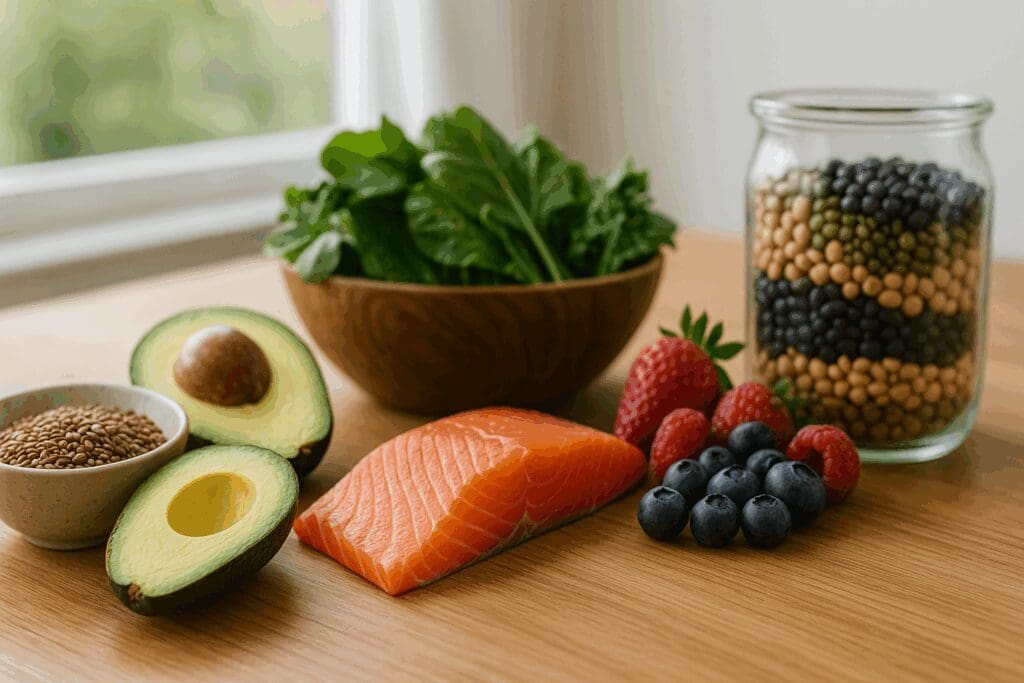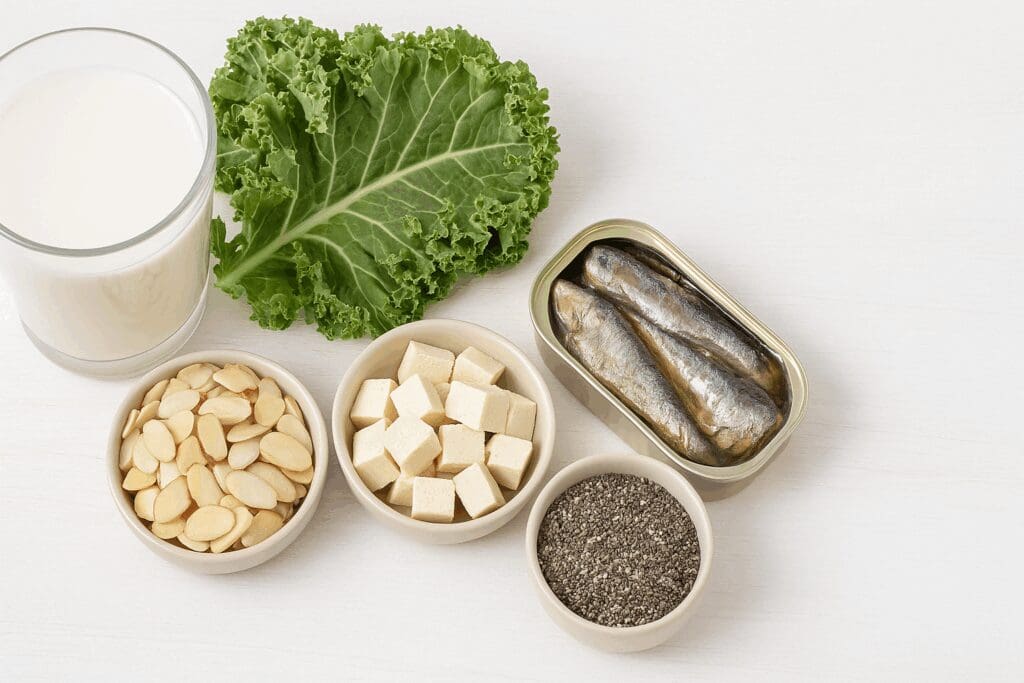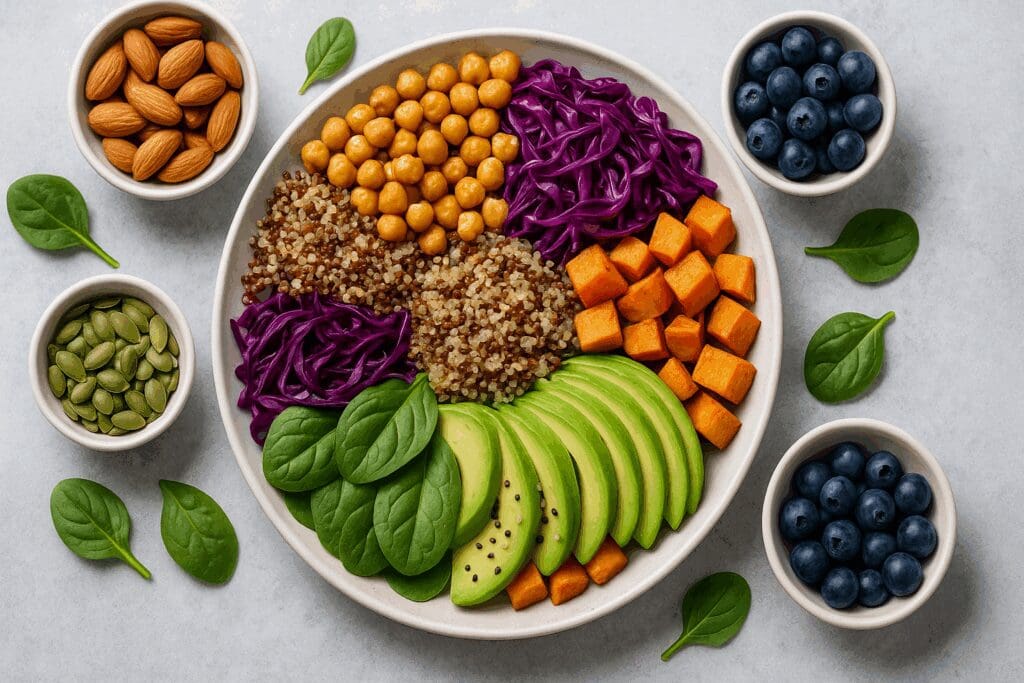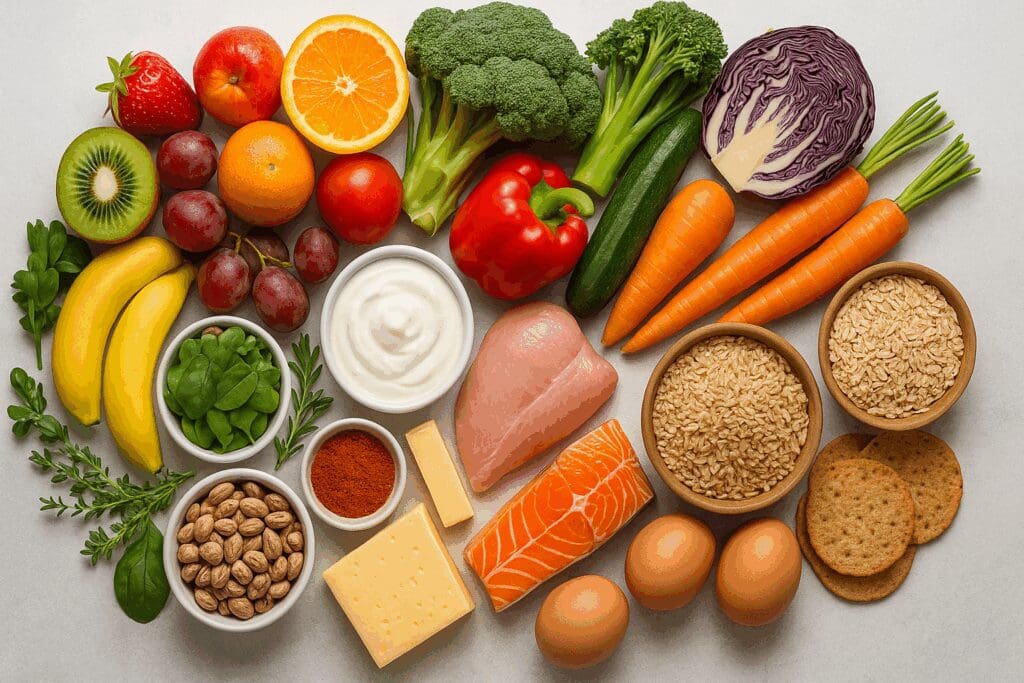Understanding what kind of food women should eat for optimal health requires a detailed exploration of both macronutrient and micronutrient needs, specific hormonal cycles, lifestyle demands, and health goals. Nutrition is not one-size-fits-all, and for women, this becomes particularly clear as dietary needs shift across various life stages such as puberty, reproductive years, pregnancy, lactation, and menopause. Each phase introduces unique physiological challenges and nutritional priorities, making it imperative to tailor dietary choices accordingly. Whether navigating a high-paced career, managing family responsibilities, or dealing with health conditions like polycystic ovary syndrome (PCOS) or iron deficiency anemia, food plays a foundational role in a woman’s vitality, energy, and resilience.
You may also like: Top Expert-Recommended Vegan Main Meals to Fuel Women’s Health and Energy
Why Nutritional Needs Differ for Women
Women experience a wide array of biological changes over their lifespans that influence nutritional requirements. Hormones like estrogen and progesterone impact metabolism, appetite, and even mood, making women more susceptible to specific nutrient deficiencies at different ages. For instance, menstruating women often face iron loss that must be replenished through diet, while pregnant and breastfeeding women need higher levels of folic acid, calcium, and omega-3 fatty acids to support fetal and infant development. Menopause introduces its own set of nutritional concerns, particularly bone density loss and an increased risk of cardiovascular disease, which require an increased intake of vitamin D and heart-friendly fats. Understanding these distinct needs is crucial in building a sustainable, nourishing eating pattern.

What Kind of Food Builds Hormonal Balance Naturally
Hormonal balance is key to women’s health and wellbeing. Eating the right foods helps regulate endocrine function and minimize symptoms associated with hormonal fluctuations, such as acne, fatigue, PMS, and even infertility. Healthy fats like those found in avocados, flaxseeds, and wild-caught salmon are essential for hormone synthesis. Leafy greens and cruciferous vegetables support estrogen detoxification, which is particularly beneficial for women with estrogen dominance. High-fiber foods, including legumes, whole grains, and berries, aid in blood sugar regulation, reducing the risk of insulin resistance, which can exacerbate hormonal disorders like PCOS. Including a wide variety from a well-balanced eatables list that focuses on anti-inflammatory, whole-food sources empowers women to support hormonal stability at every life stage.

What Kind of Food Enhances Energy and Reduces Fatigue
Persistent fatigue is a common complaint among women, often linked to suboptimal nutrition. Iron-rich foods such as lentils, spinach, and lean red meat help combat iron deficiency anemia, a common cause of tiredness in menstruating women. Complex carbohydrates, found in oats, quinoa, and brown rice, provide a steady release of energy without spiking blood sugar. Magnesium-rich foods, including pumpkin seeds, dark chocolate, and bananas, support muscle function and reduce fatigue, while B-complex vitamins found in eggs, legumes, and whole grains are essential for cellular energy production. Incorporating foods from a comprehensive foods list that supports adrenal health—such as adaptogenic herbs, seeds, and seaweed—can also aid in minimizing stress-related exhaustion.

What Kind of Food Women Should Eat to Improve Bone Health
Bone health becomes a pressing concern for women, particularly after menopause when declining estrogen levels accelerate bone loss. Dairy products like yogurt, cheese, and milk are traditional sources of calcium, but women who are lactose intolerant or vegan can turn to fortified plant milks, tofu, almonds, and leafy greens for this vital nutrient. Vitamin D, which aids in calcium absorption, can be found in fatty fish like sardines and mackerel, as well as fortified cereals. Vitamin K, another bone-supportive nutrient, is abundant in kale, broccoli, and Brussels sprouts. A diverse foods list rich in anti-inflammatory elements also helps reduce bone resorption. Including a variety of protein sources such as eggs, legumes, and lean meats helps maintain muscle mass, which in turn supports skeletal integrity.
What Kind of Food Supports Heart Health in Women
Heart disease remains a leading cause of death among women, underscoring the importance of dietary choices that promote cardiovascular wellness. Omega-3 fatty acids found in fatty fish, walnuts, and chia seeds reduce triglyceride levels and inflammation. Soluble fiber, present in oats, beans, and apples, helps lower LDL cholesterol. Potassium-rich foods like sweet potatoes and bananas help control blood pressure. Including antioxidant-rich fruits such as berries, grapes, and oranges helps combat oxidative stress, a contributor to arterial damage. Women can create a heart-healthy diet from a diverse eatables list that emphasizes whole grains, plant-based proteins, and minimally processed ingredients, providing both taste and long-term protection.
What Kind of Food Aids in Healthy Weight Management
Weight management is not solely about caloric intake but about nutrient density and metabolic support. Fiber-rich foods help promote satiety, reduce cravings, and stabilize insulin levels. Legumes, whole grains, and vegetables are key components of a diet designed to maintain a healthy weight without depriving the body. Healthy fats like those in olive oil and nuts help signal fullness to the brain. Protein, whether from animal or plant sources, supports lean muscle mass and increases thermogenesis, aiding in metabolic rate maintenance. A well-curated foods list that includes a balance of macronutrients not only helps in reaching an ideal body weight but also ensures energy levels and hormonal harmony are preserved.
What Kind of Food Benefits Women with PCOS
Polycystic Ovary Syndrome (PCOS) is a complex condition characterized by insulin resistance, irregular cycles, and hormonal imbalances. Managing PCOS with nutrition involves stabilizing blood sugar through low-glycemic carbohydrates and including high-fiber foods. Non-starchy vegetables like broccoli, cauliflower, and leafy greens are staples. Anti-inflammatory foods such as turmeric, ginger, and omega-3-rich seeds support hormonal balance. Women with PCOS often benefit from avoiding refined sugars and processed grains. An individualized approach to diet—guided by a detailed eatables list that accounts for personal triggers and preferences—helps reduce symptoms, regulate cycles, and improve fertility outcomes.
What Kind of Food to Include During Pregnancy and Lactation
Pregnancy and lactation are periods of increased nutritional demand. Folate-rich foods such as lentils, asparagus, and citrus fruits are critical during early pregnancy to prevent neural tube defects. Protein needs rise significantly, making eggs, dairy, and legumes essential. DHA, an omega-3 fatty acid found in fish and flaxseed, supports fetal brain development. Iron needs also increase, and sources like beef, spinach, and iron-fortified cereals should be emphasized. Hydration and a varied foods list with ample fruits and vegetables help manage common pregnancy concerns like constipation and leg cramps. Postpartum, continuing nutrient-rich eating supports milk production and recovery.
What Kind of Food Women Should Eat to Manage Menopause Symptoms
Menopause marks a significant shift in hormonal patterns that can influence metabolism, mood, and bone health. Phytoestrogens, found in soybeans, tofu, and flaxseeds, can mimic estrogen in the body and may ease symptoms like hot flashes. Vitamin E from almonds and sunflower seeds may help reduce night sweats, while magnesium supports better sleep. Whole grains, rich in B vitamins, stabilize mood and energy. A menopause-friendly foods list should also include hydration-boosting items like cucumbers and watermelon to combat dryness and fatigue. Avoiding caffeine and spicy foods may help minimize discomfort. Eating strategically during this life stage helps maintain balance and wellness.

The Role of Plant-Based Diets in Women’s Health
While not every woman chooses a vegetarian or vegan lifestyle, incorporating more plant-based foods can significantly enhance overall health. A plant-focused eatables list emphasizes legumes, whole grains, nuts, seeds, fruits, and vegetables—all of which are dense in fiber, antioxidants, and phytochemicals. These components help lower the risk of chronic diseases such as diabetes, hypertension, and certain cancers. Moreover, plant-based proteins like lentils and chickpeas provide essential amino acids without the saturated fat found in red meat. Including a spectrum of plant colors ensures a broad intake of vitamins and minerals. For women, especially those with family histories of metabolic or cardiovascular conditions, adopting even a semi-vegetarian approach can yield long-term benefits.
How to Build a Balanced Foods List for Daily Meals
Creating a daily foods list that aligns with health goals involves strategic planning and a deep understanding of nutrient synergy. Breakfast might include whole grain oats topped with chia seeds and berries, offering fiber and antioxidants. Lunch could be a quinoa salad with leafy greens, chickpeas, and olive oil for protein and healthy fats. Snacks like Greek yogurt or almond butter with apple slices help maintain energy between meals. Dinner might incorporate grilled salmon, steamed broccoli, and sweet potatoes for a nutrient-dense, satisfying meal. Rotating different foods within the same categories prevents monotony and supports microbial diversity in the gut. Weekly planning helps ensure that meals remain nutritionally robust and varied.
What Kind of Food Women Should Avoid for Optimal Health
While focusing on nutrient-dense foods is vital, recognizing what to limit or avoid is equally important. Processed foods high in trans fats, added sugars, and sodium can contribute to inflammation, weight gain, and chronic disease risk. Sweetened beverages, packaged snacks, and deep-fried items are often devoid of beneficial nutrients and may exacerbate conditions like insulin resistance or hypertension. Reducing intake of processed meats and excessive alcohol further supports long-term health. A foods list geared toward elimination should not feel restrictive but empowering, emphasizing alternatives that nourish while still satisfying the palate.
Addressing Common Nutrient Deficiencies in Women
Women are particularly susceptible to deficiencies in iron, calcium, vitamin D, and B12, especially those following restrictive diets or experiencing heavy menstrual cycles. Iron-rich foods such as organ meats, legumes, and dark leafy greens help maintain energy and prevent anemia. Calcium is critical for bone strength and can be sourced from dairy or fortified plant alternatives. Vitamin D synthesis from sunlight may be insufficient in certain climates, so dietary sources like fatty fish and fortified cereals become important. B12, found in animal products, is essential for neurological health and energy metabolism. Monitoring symptoms and considering regular blood tests helps guide supplementation or dietary adjustments.

Exploring Various Types of Food and Their Unique Benefits
A diverse diet encompassing various types of food enhances overall nutrient intake and prevents deficiencies. Fruits and vegetables offer vitamins, fiber, and phytonutrients, while grains supply complex carbohydrates and B vitamins. Dairy provides calcium and probiotics, supporting bone and gut health. Protein sources vary in their amino acid profiles and can be mixed to ensure completeness. Herbs and spices like turmeric, ginger, and garlic not only add flavor but also provide medicinal benefits. Including a wide range of items in your foods list allows for flavor diversity, increased nutrient exposure, and better adherence to healthy eating patterns.
Understanding the Emotional and Cultural Dimensions of Food
Eating is not merely a biological act; it carries emotional, psychological, and cultural weight. For many women, food represents tradition, comfort, celebration, and even identity. While navigating health-conscious choices, it’s important to honor these emotional connections without guilt. Incorporating family recipes in a healthier format or sharing meals with loved ones can enhance psychological wellbeing. Stress-related eating patterns can be managed through mindfulness, meal prep, and structured eating schedules. An emotionally intelligent approach to nutrition acknowledges that sustainable habits must feel enriching, not punishing.
Practical Tips for Sustaining a Healthy Diet Long-Term
Long-term dietary success hinges on convenience, taste, and personal relevance. Batch cooking, using meal prep containers, and shopping with a structured eatables list can save time and reduce reliance on processed options. Keeping healthy snacks like trail mix, hummus, or boiled eggs accessible curbs unhealthy cravings. Eating mindfully—chewing slowly, savoring flavors, and listening to hunger cues—supports digestion and satisfaction. Seeking social support, whether through online communities or friends with similar goals, reinforces motivation. Gradual changes tend to stick better than drastic overhauls, allowing for adaptation and learning.
What Kind of Food Women Should Embrace as Preventive Medicine
Food is increasingly being recognized not just as nourishment but as preventive medicine. Anti-inflammatory diets that emphasize fruits, vegetables, omega-3 fats, and whole grains have been shown to reduce the risk of autoimmune disorders, metabolic syndrome, and even certain cancers. Fermented foods like kefir, sauerkraut, and miso contribute to gut health, which in turn influences immunity and mood. High-antioxidant foods such as berries, green tea, and dark chocolate protect against oxidative stress. A thoughtfully crafted foods list becomes a daily prescription for vitality, resilience, and disease prevention.
Frequently Asked Questions (FAQ) on Nutritional Choices for Women
How can women tailor their diet when transitioning to a plant-based lifestyle?
Transitioning to a plant-based diet can offer numerous health benefits for women, including reduced inflammation, improved digestion, and a lower risk of chronic diseases. However, one of the challenges lies in ensuring adequate intake of critical nutrients like vitamin B12, iron, and omega-3 fatty acids. Women should prioritize a diverse foods list that includes fortified plant-based milks, nutritional yeast, seaweed, and legumes to meet these nutritional demands. Pairing vitamin C-rich foods like bell peppers or oranges with iron-rich plant sources can also significantly enhance iron absorption. It’s essential to recognize that the success of a plant-based diet depends on strategic planning rather than mere elimination of animal products.
What kind of food choices support cognitive health and focus in women?
Certain foods play a profound role in enhancing mental clarity, memory, and overall brain function, especially for women balancing careers, caregiving, and education. Omega-3 fatty acids from flaxseeds, chia seeds, and fatty fish help preserve cognitive integrity by supporting neuronal health and reducing inflammation. Additionally, incorporating dark berries, which are rich in anthocyanins, can improve memory and protect the brain from oxidative stress. A strategic eatables list that includes whole grains, eggs, and leafy greens supports consistent energy levels and neurotransmitter function. These dietary patterns not only improve focus but may also reduce the risk of cognitive decline as women age.
Can emotional eating be managed through strategic food selection?
Yes, emotional eating often stems from hormonal fluctuations or chronic stress, and it can be managed by choosing foods that stabilize mood and promote satiety. High-protein snacks, such as Greek yogurt or hard-boiled eggs, help regulate blood sugar and curb cravings. Magnesium-rich options like dark chocolate or pumpkin seeds can ease anxiety and improve sleep quality. Building an intentional foods list for emotional resilience might include tryptophan-containing items such as turkey or oats, which support serotonin production. Women should also consider keeping a food and mood journal to identify triggers and assess how various types of food influence their emotional state over time.
What kind of food strategies are best for women with sedentary lifestyles?
Women with less physically active routines need to focus on nutrient-dense rather than calorie-dense foods to maintain optimal health. Incorporating high-fiber vegetables, lean proteins, and whole grains ensures satiety without excess calories. Swapping sugary snacks for fruit and nut combinations from a thoughtful eatables list supports metabolic balance and reduces the risk of insulin resistance. Hydration also plays a significant role, as mild dehydration can often be mistaken for hunger. Strategic portion control, combined with smaller, more frequent meals, helps keep energy steady without leading to weight gain.
How should women adjust their diet during high-stress periods or burnout recovery?
During times of high stress or recovery from burnout, the body’s demand for specific nutrients increases, particularly those involved in adrenal and nervous system support. Foods rich in B vitamins, like avocados and whole grains, are crucial for energy metabolism and mood regulation. Adaptogenic herbs such as ashwagandha or rhodiola, often available in teas or smoothies, can help stabilize cortisol levels. A rejuvenating foods list might also include fermented foods like kimchi or kefir to nourish the gut-brain axis, which heavily influences stress resilience. Prioritizing regular meals and minimizing caffeine and sugar intake can further help restore physiological balance.
What kind of food should women consume to support skin health naturally?
Diet significantly influences skin appearance and resilience, and certain foods can enhance hydration, elasticity, and glow. Omega-3 rich items such as walnuts and sardines help maintain skin barrier integrity and reduce inflammation. Vitamin C, found in citrus fruits and bell peppers, is essential for collagen synthesis and skin repair. Selenium-rich foods like Brazil nuts also protect against oxidative damage that accelerates aging. A skin-supportive eatables list should also feature plenty of water-dense fruits, such as watermelon and cucumbers, which contribute to both internal hydration and visible radiance.
How do various types of food affect menstrual health and cycle regularity?
Menstrual health is intricately linked to nutritional choices, and women can optimize their cycles through targeted dietary strategies. Iron-rich foods like lentils and lean meats replenish iron lost during menstruation and help prevent fatigue. Consuming foods high in zinc, such as pumpkin seeds, may reduce cramps and support hormone regulation. Stable blood sugar levels, achieved through complex carbohydrates and lean proteins, promote hormonal equilibrium and reduce symptoms like bloating or irritability. Building a foods list aligned with the menstrual cycle—emphasizing anti-inflammatory and iron-boosting items—can greatly improve both comfort and regularity.
What kind of food plan is ideal for women pursuing high-intensity athletic training?
Women engaged in intense physical training need higher energy and protein intake, alongside strategic timing of meals. Carbohydrate-rich foods like sweet potatoes and quinoa replenish glycogen stores post-exercise, while lean proteins support muscle repair and growth. Antioxidant-rich berries and leafy greens help combat oxidative stress caused by rigorous activity. A performance-oriented eatables list might also include turmeric and ginger for their anti-inflammatory benefits. Hydration and electrolyte balance, supported by foods like bananas and coconut water, are also essential for recovery and sustained endurance.
What role does a personalized foods list play in long-term dietary success for women?
A personalized foods list acts as a blueprint tailored to a woman’s unique physiological needs, preferences, and lifestyle goals. It allows for consistency without monotony, offering flexibility to adapt across different life stages, from adolescence to menopause. For example, a woman managing PCOS may prioritize insulin-stabilizing foods, while another in her 60s may focus on calcium and phytoestrogens. Personalization also respects cultural and emotional relationships with food, which is key to long-term adherence. Ultimately, such a tailored plan serves as a sustainable, enjoyable, and intuitive guide to wellness.
How can women use what kind of food principles to support longevity and aging gracefully?
Applying principles rooted in what kind of food supports long-term vitality means focusing on both cellular protection and metabolic efficiency. Women should aim to reduce chronic inflammation through diets rich in polyphenols, found in green tea, berries, and olives. Healthy fats from avocado and nuts improve cardiovascular health and cognitive function, while minimizing refined carbohydrates helps preserve metabolic flexibility. Intermittent fasting, paired with a nutrient-dense foods list, is also emerging as a promising approach to longevity. These strategies don’t just extend lifespan—they enhance healthspan, allowing women to maintain independence, strength, and mental acuity well into later decades.
Conclusion: Building Your Personalized Guide to What Kind of Food You Should Eat
Understanding what kind of food women should eat for optimal health involves more than following trends or adhering to rigid rules—it requires a holistic, evidence-based, and individualized approach. From enhancing energy and hormonal balance to supporting reproductive health and preventing chronic illness, every bite holds the potential to shape long-term wellbeing. The beauty of this journey lies in its flexibility: women can craft personalized, culturally respectful, and emotionally satisfying diets without compromising on nutrition. A varied foods list enriched with whole, minimally processed ingredients lays the foundation for lifelong health. As we continue to uncover more about the interplay between diet, lifestyle, and genetics, one thing remains clear: nourishing food choices, rooted in understanding and intention, are among the most powerful tools a woman can wield in her pursuit of vitality and longevity.
Further Reading:
Basic Foods Checklist: How to Stock Your Kitchen for Simple Meals



